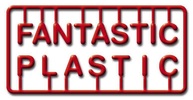Science Fiction -1980s
If the 1950s was science fiction's Golden Age, then the 1980's was its Silver.
The premiere of "Star Wars" in 1977 and the further success of its sequels, "The Empire Strikes Back" (1980) and "Return of the Jedi" (1983), took what had been a cult genre and launched it solidly into the commercial mainstream. Suddenly, every studio was in the science fiction business. In the movies, the resulting products ranged from the cheesy (e.g. Roger Corman's "Battle Beyond the Stars" - 1980) to the witty (e.g. Robert Zemeckis' "Back to the Future" - 1985) to the technically innovative (e.g. Nick Castle's "The Last Starfighter"- 1984) to the classic (James Cameron's "Aliens" - 1986). But regardless of these films' narrative qualities, most produced vehicle designs that would do any model collection proud.
Following the critically panned but financially successful "Star Trek: The Motion Picture," Paramount kept its franchise growing with "Star Trek II: The Wrath of Khan" (1982), "Star Trek III: The Search for Spock" (1984), and the most successful sequel of them all, "Star Trek IV: The Voyage Home" (1986).
In 1987, after the studio failed to launch a "fourth network," it entered the brave new world of first-run TV syndication with "Star Trek: The Next Generation," helmed by the Great Bird of the Galaxy himself, Gene Roddenberry. With a new ship and a new crew quickly gaining audience acceptance, Paramount realized it had a cash cow that it could conceivably milk all the way to the new millennium. And fantastic model builders had a whole new lode of spacecraft designs to mine.
This same decade saw the birth of several "garage kit" companies, small operations that created and distributed limited run resin and vacuform kits based on favorite sci-fi subjects -- many of them from the 1950's and 1960's -- that had not previously been captured in miniature.
The premiere of "Star Wars" in 1977 and the further success of its sequels, "The Empire Strikes Back" (1980) and "Return of the Jedi" (1983), took what had been a cult genre and launched it solidly into the commercial mainstream. Suddenly, every studio was in the science fiction business. In the movies, the resulting products ranged from the cheesy (e.g. Roger Corman's "Battle Beyond the Stars" - 1980) to the witty (e.g. Robert Zemeckis' "Back to the Future" - 1985) to the technically innovative (e.g. Nick Castle's "The Last Starfighter"- 1984) to the classic (James Cameron's "Aliens" - 1986). But regardless of these films' narrative qualities, most produced vehicle designs that would do any model collection proud.
Following the critically panned but financially successful "Star Trek: The Motion Picture," Paramount kept its franchise growing with "Star Trek II: The Wrath of Khan" (1982), "Star Trek III: The Search for Spock" (1984), and the most successful sequel of them all, "Star Trek IV: The Voyage Home" (1986).
In 1987, after the studio failed to launch a "fourth network," it entered the brave new world of first-run TV syndication with "Star Trek: The Next Generation," helmed by the Great Bird of the Galaxy himself, Gene Roddenberry. With a new ship and a new crew quickly gaining audience acceptance, Paramount realized it had a cash cow that it could conceivably milk all the way to the new millennium. And fantastic model builders had a whole new lode of spacecraft designs to mine.
This same decade saw the birth of several "garage kit" companies, small operations that created and distributed limited run resin and vacuform kits based on favorite sci-fi subjects -- many of them from the 1950's and 1960's -- that had not previously been captured in miniature.























































